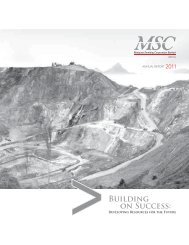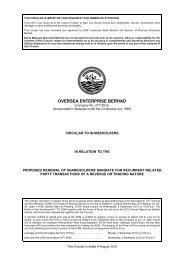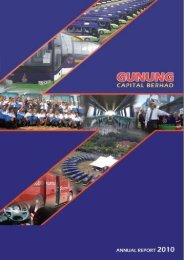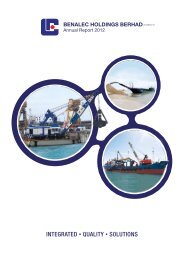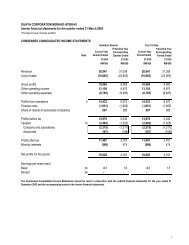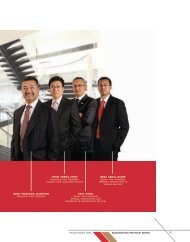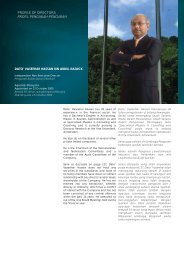UOBKH/AR09 [web] - ChartNexus
UOBKH/AR09 [web] - ChartNexus
UOBKH/AR09 [web] - ChartNexus
You also want an ePaper? Increase the reach of your titles
YUMPU automatically turns print PDFs into web optimized ePapers that Google loves.
12<br />
Economic Review & Outlook 2010 (continued)<br />
Despite the challenging external environment, Singapore’s<br />
economy was relatively resilient. This was underpinned by the<br />
government’s proactive measures to boost the economy through<br />
an expansionary 2009 Budget and measures such as Jobs Credit<br />
Scheme and Special Risk-Sharing Initiatives (SRI).<br />
Outlook for 2010<br />
UOB Economic-Treasury Research forecasts 2010 GDP growth at<br />
5.8%, in line with the Ministry of Trade and Industry’s (MTI)<br />
forecast of 4.5-6.5% GDP growth in 2010.<br />
Looking ahead, evidences of a further economic recovery looks<br />
to be gaining ground. The service industries, particularly retail,<br />
and hotels, are expected to enjoy a boost from the opening of<br />
the two integrated resorts in 2010. Supporting this is a strong<br />
17.5% rise in Jan 10’s tourist arrivals. Singapore Tourism Board<br />
(STB) forecasts a 19-29% rise in 2010 tourist arrivals.<br />
Stock Market Review for 2009<br />
After bottoming out in Mar 09 at 1,459.95, the FSSTI rallied 99%<br />
from its low to end 2009 at 2,897.62. The sharp turnaround in<br />
the FSSTI was in line with regional markets, which recovered on<br />
coordinated government stimulus measures and expectations of<br />
improving corporate earnings.<br />
As a result of the market’s strong recovery from its bottom in Mar<br />
09, sectors that underperformed the FSSTI included low beta<br />
and resilient sectors such as land transport, media and<br />
telecommunications. Conversely, sectors that enjoyed the<br />
strongest recovery in share price include Supply Chain, Plantation<br />
and Property.<br />
Stock Market Outlook for 2010<br />
Singapore is well-placed to benefit from the global economic<br />
recovery. The banking sector is well-capitalised. The expected<br />
recovery of corporate loans will complement consumer loan<br />
growth and it is expected to drive loan growth of 5-8% in 2010.<br />
Although the macroeconomic newsflow for Singapore remains<br />
upbeat, we believe investors may take a measured approach to<br />
Singapore’s stock market after the FSSTI’s 65% rally in 2009.<br />
Therefore, we advocate a balanced approach to the market,<br />
preferring a combination of high dividend yield stocks as well as<br />
stocks with company-specific catalysts.<br />
T H A I L A N D<br />
Review of 2009<br />
Despite the sharp contraction during the first three quarters of<br />
the year as a result of the global economic crisis, Thailand’s GDP<br />
grew 5.8% in the last quarter on the back of strong exports<br />
recovery, given the faster-than-expected economic recovery of its<br />
trading partners, steady expansion in public spending and<br />
recovery in household consumption expenditure. Thailand’s fullyear<br />
GDP contracted 2.3%, better than the consensus estimate of<br />
2.5-3.5% contraction. Headline inflation declined to -0.9% due<br />
to weaker oil price as well as the government’s measures to ease<br />
the high cost of living. Core inflation stood at 0.3%.<br />
Outlook for 2010<br />
For 2010, UOB Economic-Treasury Research has forecasted Thai<br />
GDP growth of 4.3%, which is at the top range of the consensus<br />
but appears possible if there is no delay in the resolution of the<br />
suspension of capital-intensive projects at the Map Ta Phut<br />
industrial estate, political situation kept under control and public<br />
spending under the Strong Thai Scheme progresses smoothly.<br />
Other growth catalysts include increasing household income in<br />
tandem with domestic economic recovery, a decline in<br />
unemployment rate to its normal rate of around 1-1.2%, and rising<br />
farm income from high agricultural prices. The Thai baht/ US$<br />
exchange rate of Bt33 is likely to strengthen towards the end of<br />
2010. Inflation has been on an uptrend since 4Q09 but it is still<br />
within control. Thus, the policy rate will be kept at 1.25%, at least<br />
until the middle of 2010.<br />
Stock Market Review for 2009<br />
Overall, the Stock Exchange of Thailand (SET) Index performed<br />
better in 2009 than 2008, both in terms of price levels and trading<br />
values despite all political and economic crises, domestically and<br />
worldwide. In 2009, the SET Index closed at 734, an increase of<br />
63% over year-end 2008. In 2009, the Index reached the highest<br />
level of 751.86 and lowest level of 411.27. The top five best<br />
performing sectors are Agriculture (+175%), Construction<br />
Materials (+112%), Petrochemicals (+107%), Banking (+105%)<br />
and Agro and Food (+104%). Daily average trading value was<br />
US$525.6m, up 12.5% over 2008. Foreign investors made a major<br />
shift from being net sellers in 2008 with a position of US$4.91b<br />
to net buyers in 2009 with US$1.15b.<br />
Stock Market Outlook for 2010<br />
Given a modest pick-up in corporate profitability this year, the<br />
SET Index is likely to advance at a slower pace compared to 2009.<br />
Based on the bottom-up approach using 2010 target price for<br />
stocks under our coverage and consensus estimates for non-rated<br />
stocks, the SET Index has around 15-20% upside from the current<br />
level to reach 863. The major drivers of the Index’s rise are:<br />
a) an economic recovery with GDP growth of 3-4%, b) doubledigit<br />
net profit growth and c) the injection of massive public<br />
spending under the Strong Thai Scheme. Our investment strategy<br />
for 2010 focuses on sectors which offer good earnings growth.<br />
We prefer Banks on their good earnings growth and attractive<br />
valuations. Small-cap sectors like Media, Contractors and<br />
Healthcare are recovery plays. Earnings growth for the Energy<br />
sector will be good but its prospects are clouded by the unclear<br />
outcome of the Map Ta Phut issue.


![UOBKH/AR09 [web] - ChartNexus](https://img.yumpu.com/18127887/14/500x640/uobkh-ar09-web-chartnexus.jpg)
